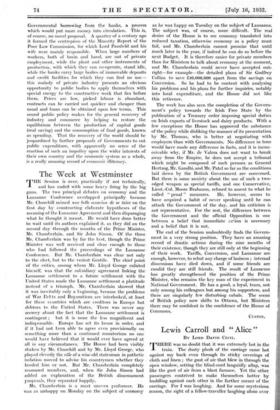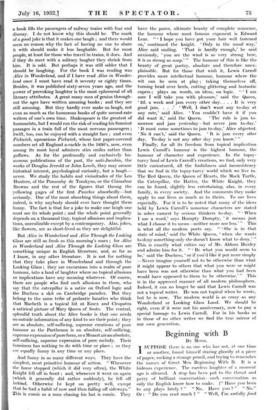Lewis Carroll and " Alice "
BY LORD DAVID CECIL.
THERE was no doubt that it was extremely hot in the train. The dusty plush of the carriage came hot against my back even through. its sticky coverings of cloth and linen ; the gust of air that blew in through the open window, setting the blind-cord languidly aflap, was like the gust of air from a blast furnace. Yet the other, passengers contrived to make themselves hotter by huddling against each other in the further corner of the carriage. For I was laughing. And for some mysterious reason, the sight of a fellow-traveller laughing alone over. a book fills the passengers of railway trains with fear and dismay. I do not know why this should be. The mark of a good joke is that it makes one laugh ; and there would seem -no reason why the fact of having no one to share it with should make it less laughable. But for most people, at least for those who travel in trains, it does. And if they do meet with a solitary laugher they shrink from him. It is odd. But perhaps it was still odder that I should be laughing. For the book I was reading was Alice in• Wonderland, and if I have read Alice in Wonder- land once I must have read it seventy or eighty times. Besides, it was published sixty-seven years ago, and the power of provoking laughter is the most ephemeral of all literary attributes. A great many men of genius through- out the ages have written amusing books ; and they are still amusing. But they hardly ever make us laugh, not even as much as the humorous books of quite second-rate writers of one's own time. Shakespeare is the greatest of humourists, but I would run the risk of reading his funniest passages in a train full of the most nervous passengers ; Swift, too, can be enjoyed with a straight face ; and even Pick-zvick, uproarious Pickwick, whose first paper-covered numbers set all England a-cackle in the 1830's, now, even among its most loyal admirers stirs smiles rather than guffaws. As for the professedly and exclusively hu- morous publications of the past, the anti-Jacobin, the works of Douglas Jerrold or John Leech, they may arouse historical interest, psychological curiosity, but a laugh— never. We study the habits and vicissitudes of the Leo Hunters, of the Ponsonby de Tomkyns, or the Chimabue Browns and the rest of the figures that throng the yellowing pages of the first Punches absorbedly—but seriously. One of the most absorbing things about them, indeed, is why anybody should ever have thought them funny. The fact is that for a joke to make one laugh one must see its whole point ; and the whole point generally depends on a thousand tiny, topical allusions and implica- tions, unrealizable except by a contemporary. Alas, jokes, like flowers, are as short-lived as they are delightful.
But Alice in Wonderland and Alice Through the Looking Glass are still as fresh as this morning's roses ; for Alice in Wonderland and Alice Through the Looking Glass are something unique in English literature, and, as far as I know, in any other literature. It is not for nothing that they take place in Wonderland and through the Looking Glass ; they are excursions into a realm of pure humour, into a land of laughter where no topical allusions or implications have any meaning whatever. Of course, there are people who find such allusions in them, who say that the caterpillar is a satire on Oxford logic and the Duchess a skit on Cambridge paradox. But they belong to the same tribe of pedantic lunatics who think that Macbeth is a topical hit at Essex and Cleopatra a satirical picture of Mary Queen of Scots. The central, splendid truth about the Alice books is that one needs no outside information of any kind to see their point ; they are as absolute, self-sufficing, supreme creations of pure humour as the Parthenon is an absolute, self-sufficing, supreme expression of pure form, or a Mozart air an absolute, self-sufficing, supreme expression of pure melody. Their funniness has nothing to do with time or place ; so they are equally funny in any time or any place.
And funny in so many different ways. They have the simplest, most primitive humour of action. " Whenever the horse stopped (which it did very often), the White Knight fell off in front ; and, whenever it went on again (which it generally did rather suddenly), he fell off behind. 'Otherwise he kept on pretty well, except that head a habit of now and then falling off sideways." This is comic as a man chasing his hat is comic. They have the purer, ultimate beauty of complete nonsense, the humour whose most famous exponent is Edward Lear. " I hope you have got your hair well fastened on,' continued the knight. Only in the usual way,' Alice said smiling. That is hardly enough,' he said anxiously, you see the wind is so very strong here, it is as strong as soup.' " The humour of this is like the beauty of great poetry, absolute and therefore unex- plainable. But for those that wish it, Lewis Carroll provides more intellectual humour, humour where the wit can be seen at play ; taking themselves off, turning head over heels, cutting glittering and fantastic capers ; plays on words, on ideas, on logic. " I am sure I will take you with pleasure,' said the Queen, ' 2d. a week and jam every other day. . . . It is very goad jam. . . .' Well, I don't want any to-day at any rate,' said Alice. You couldn't have it if you did want it,' said the Queen. The rule is jam to- morrow and jam yesterday—but never jam to-day.' It must come sometimes to jam to-day,' Alice objected.
No it can't,' said the Queen. It is jam every other day. To-day is not any other day you know.' " Finally, for all its freedom from topical implication Lewis Carroll's humour is the highest humour, the humour of character and experience. In the topsy- turvy land of Lewis Carroll's creations, we find, only very little caricatured, all the foolishness and inconsistency that we find in the topsy-turvy world which we live in. The Red Queen, the Queen of Hearts, the Mock Turtle, the Caterpillar, the Hatter, the White Knight, they can be found, slightly less entertaining, alas, in every family, in every society. And the comments they make apply to our lives as much as to theirs. To our lives especially. For it is to be noted that many of the ideas held by Lewis Carroll's nonsense characters are stated in sober earnest by serious thinkers to-day. " When I use a word,' says Humpty Dumpty, it means just what I choose it to mean—neither more nor less.' " This is what all the modern poets say. " She is in that state of mind,' said the White Queen, when she wants to deny something only she doesn't know what to deny.' This is exactly what critics say of Mr. Aldous Huxley and admire him for it.' " Be what you would seem to be,' said the Duchess, or if you'd like it put more simply —Never imagine yourself not to be otherwise than what it might appear to others that what you were or might have been was not otherwise than what you had been would have appeared to them to be otherwise.' " This is in the approved manner of all modern philosophers. Indeed, it can no longer be said that Lewis Carroll was not a topical writer. He was not topical when he wrote, but he is now. The modern world is as crazy as any Wonderland or Looking Glass Land. We should be right, even if it were not his anniversary, now to pay a special homage to Lewis Carroll. For in his books as in those of no other writer we find the true mirror of our own generation.



































 Previous page
Previous page